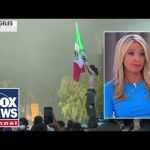President Trump’s deployment of the National Guard to Los Angeles rests on specific federal statutes granting executive authority during domestic unrest. While California officials claim constitutional violations, federal law explicitly allows such actions under defined circumstances.
Trump cited , which permits the president to federalize National Guard units during rebellions or when regular forces cannot enforce U.S. laws. The White House argued that violent protests inhibiting federal immigration enforcement constituted a “rebellion” under this statute. This provision has historical precedent, though its application here reflects a broader debate over federalism.
California’s lawsuit alleges Trump overstepped the 10th Amendment, but the federal government maintains supremacy in enforcing national laws. The Guard’s limited mission—protecting federal agents and buildings—aligns with the administration’s duty to uphold immigration statutes, even in states resisting federal policy.
The deployment followed escalating clashes between protesters and law enforcement during anti-ICE demonstrations. While local leaders condemned property damage, they framed the protests as peaceful dissent. The administration emphasized the need to restore order and safeguard federal operations, contrasting with California’s narrative of political theatrics.
Critics argue the move inflames tensions, but the legal framework supports Trump’s authority. The dispute highlights enduring tensions between federal power and state autonomy, with constitutional interpretations diverging along partisan lines.




